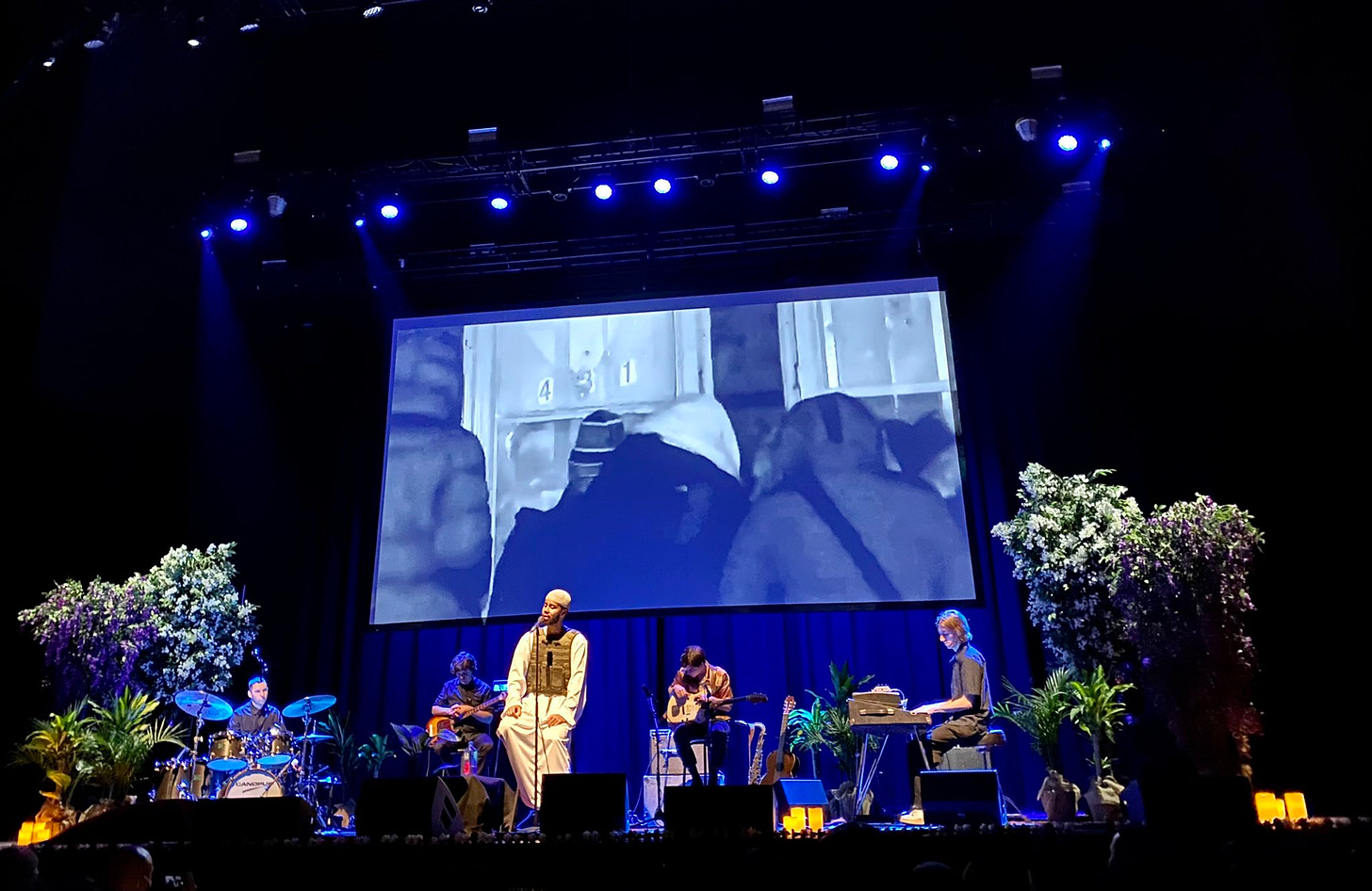If you value what you read and would like to support my work, consider Buying Me A Coffee, leaving a heart/comment on this post below, or sharing this journal with another human. If you’re not a subscriber yet, join us!
THANK YOU, LOVE YOU.
I am still there, in the sea of presence at Mustafa the Poet’s concert that took place at Massey Hall in Toronto earlier this week. Seated side by side in red velvet chairs, the gentle conductor held our hand through a timeless ‘journey of death,’ singing haunting meditations on the textures of a community grieving on the other side of gun violence that took the lives of Jahvante “Smoke Dawg” Smart and Ali Reizeig in 2017 and 2018. Both of their families are present, and I suspect their living spirits have also made an appearance.
Called Regent Park Songs, the show was a ceremony for and with a neighborhood, which is located on the east side of downtown Toronto and has been a site of gross displacement in favor of a concept of revitalization since 2005. Amongst the many layers of rupture from the inevitable gentrification and whitewashing of the architecture of a close-knit community that was brought to life by potent immigrant cultures, the incoming wealth and widening disparity complicated the economics of the street. This is the textbook explanation of course, because really, these men and communities were set up for a life of chronic uncertainty.
The night begins with a short film, produced by Mustafa, that asks Black men from communities across Toronto, like Regent, Malvern, Chester Li, to reflect on how they want to be remembered. The overwhelming desire for peace, to leave the streets, to pursue one’s dream is not shocking, but it holds a different weight when shared by folks where the gates to 'choice,’ are often made of steel. Our needs are laughably simple, which makes the labyrinthian ways that we keep people from having them met nothing short of diabolical.
I am still there, because 90min of being with what is real in a public venue feels like whiplash in a culture dominated by flashing lights, loud music and incessant denial. This was not a concert or a performance. It was not entertainment. It was an invitation into a sincere honesty. Mustafa is only 25 yo old, but it is undeniable that he has lived many lives, for better or worse, and graced with a courage of letting the pain penetrate him fully. Given his identity as a Black Muslim man, his gentleness is even more striking, when considering all the ways he could have been stripped of his nature. While singing Ali, a tribute to his fallen brother, Mustafa kneels over the keyboard in the middle of the song. The grief has risen and has flooded his throat. We witness him as it hangs like the 100ft curtains in this historic space. There is no margin to deny how hard this loss is - reminding us that this inescapable experience of human life can not be overcome; only known, welcomed and allowed.
Like a true conductor, there are exhales in the swells of sadness. ‘Let’s move forward in this spiral of depression*,’ he jokes. We can laugh at our odd condition too. Here we are, enveloped in an intoxicating rawness and sense of emotional safety and togetherness, while outside the venue is surrounded by the Toronto Police Service, who has marked this event as a potential safety concern. Across the street is the emergency room of a hospital many in the crowd know all too well. In these spatial notes, Mustafa acknowledges that the contradiction and frailty of his life, of our lives, always lingers nearby. And through the experience, it is impossible to know if this friction is a gift or curse in knowing oneself more earnestly, of loving more fiercely, without the shields and distraction of material privilege.
The only response to the impossible grief as he sees it is ‘to go to the ends of the earth to heal oneself,’ and this collective gathering and intention is evidence of his own commitment, call and duty. I am reminded of the beauty in the healing as we toe closer to tender, open wounds, and the lasting imprint when held in community. This night feels monumental. Others, like musician Shad, calls it historic. Perhaps it is because of how absent it has been over two years of constant grief in isolation, and the loss of intimacy through screens and living more disparately and privately. Or perhaps it is the recognition that we have always needed ceremony and ritual to tend to the wound, and yet the pace of survival and the increased tendency to dodge vulnerability while precarious, pressures us to forget and get on with it. But we never really get on with it.
‘There is no magical return. We’re not all going to return to an unblemished time in history,’ says movement facilitator and embodiment teacher, Prentis Hemphill in the For The Wild podcast. ‘And if we know that….what do we have to do?,’ she adds. I didn’t really know what to expect from the evening - certainly not a collective mourning and reckoning with the ways that make living and loving this city, ‘complicated,’ as Mustafa shared. I am left softened with a renewed memory that we can find each other in and between our complicated and sometimes achy realities. I am grateful for his intention and awareness of what a city, a community needed. And I am humbled by how we ‘move forward’ and find peace in our completely imperfect circumstances.
Much love,
Hima
*paraphrased
#ThisWeekInTweets
























